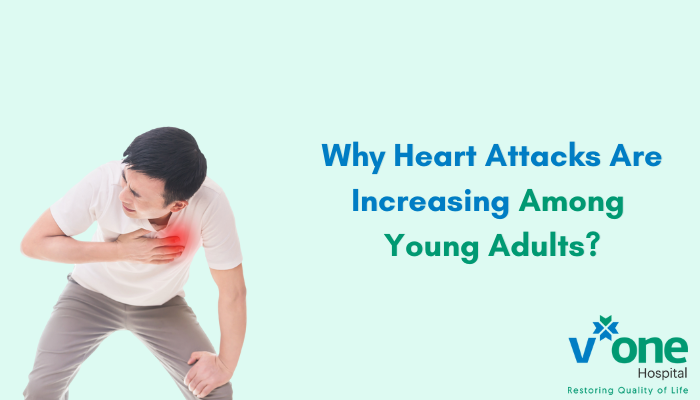Why Heart Attacks Are Increasing Among Young Adults
Heart attacks were once seen as a health concern primarily for older adults. But in recent years, there’s been a shocking shift—more and more young people in Indore are suffering from heart attacks, and it’s raising serious concerns among medical professionals, especially heart specialists in Indore.
This alarming trend calls for awareness, lifestyle modifications, and timely consultations with heart experts. Let’s dive into the reasons behind this spike and understand what young adults can do to safeguard their hearts.
The Alarming Shift: Heart Attacks in the Young
Heart attacks, or myocardial infarctions, occur when blood flow to a part of the heart is blocked, usually due to plaque buildup in the arteries. Traditionally, they were associated with people in their 50s or 60s. But today, people as young as their late 20s and 30s are being diagnosed with serious heart conditions.
In cities like Indore, where urbanization and modern lifestyles are reshaping the health profile of the youth, this issue is more relevant than ever. Cardiologists and heart specialists in Indore report a steady increase in young patients admitted with cardiac symptoms over the past few years.
Contributing Factors to Rising Heart Attacks Among Young Adults
Several interconnected factors are contributing to this worrying trend:
1. Sedentary Lifestyle
Many young adults today have desk-bound jobs, rely heavily on technology, and spend hours sitting without physical activity. Lack of regular exercise contributes to obesity, poor blood circulation, and weakened heart function.
2. Unhealthy Diet
Fast food, processed snacks, sugary drinks, and irregular eating habits are common. These lead to high cholesterol, high blood pressure, and obesity—major risk factors for heart disease.
3. Stress and Mental Health
Stress is now a silent killer. The pressure to perform, job insecurity, financial worries, and lack of work-life balance contribute significantly to cardiac stress. Chronic stress leads to increased levels of cortisol and adrenaline, which over time damage heart function.
4. Smoking and Alcohol Consumption
Tobacco and alcohol consumption is rising among young adults. Smoking, even in small amounts, damages blood vessels and increases the risk of clots, while excessive alcohol consumption leads to high blood pressure and arrhythmias.
5. Lack of Awareness
Many young individuals ignore warning signs like fatigue, chest pain, and shortness of breath, assuming they’re too young to have a heart issue. This delay in seeking help often results in emergencies.
6. Genetics and Family History
Those with a family history of heart disease are at a higher risk. Combined with poor lifestyle choices, genetic predisposition becomes a deadly mix.
Common Warning Signs in Young Adults
Heart attack symptoms in young adults may not always be as pronounced as in older individuals. Look out for:
-
Chest discomfort or pain
-
Pain in the left arm, jaw, or back
-
Shortness of breath
-
Cold sweats
-
Dizziness or nausea
-
Fatigue or sudden weakness
If you experience any of these symptoms, even briefly, consult a heart specialist in Indore immediately.
The Role of Preventive Heart Care
Prevention is always better than cure, especially when it comes to heart health. Here’s how young adults can take charge:
1. Get Regular Health Checkups
Routine checkups help monitor blood pressure, cholesterol, and blood sugar levels. Heart specialists in Indore often recommend annual checkups for individuals over 25, especially if there’s a family history of cardiac conditions.
2. Exercise Regularly
Aim for at least 30 minutes of moderate exercise five days a week. Walking, cycling, yoga, or gym workouts—any form of movement is better than none.
3. Eat a Heart-Healthy Diet
Include whole grains, leafy greens, fruits, nuts, seeds, and lean proteins. Cut back on fried foods, sugar, and salt.
4. Manage Stress
Incorporate stress-relieving practices like meditation, breathing exercises, or hobbies. Talking to a therapist can also help manage chronic anxiety and stress.
5. Avoid Smoking and Limit Alcohol
If you smoke, quit. It’s one of the most impactful changes you can make for your heart. Also, keep alcohol consumption within safe limits.
6. Monitor Your Weight
Obesity is a leading risk factor for heart disease. Maintain a healthy BMI through balanced nutrition and regular exercise.
Importance of Early Consultation with a Heart Specialist in Indore
If you experience frequent fatigue, shortness of breath, or even occasional chest discomfort, don’t brush it off. Early consultation with a heart specialist in Indore can help detect issues before they escalate.
Many hospitals and cardiac clinics in the city are now offering specialized cardiac screenings for young adults. These include ECGs, cholesterol panels, stress tests, and echocardiograms tailored to detect early signs of heart problems.
How Indore is Responding to the Crisis
Recognizing the increasing incidence of heart attacks among the youth, several hospitals in Indore have stepped up their preventive care initiatives. Awareness camps, fitness drives, and heart health education programs are being introduced to educate the population.
Additionally, advanced cardiac emergency services, well-equipped trauma centers, and 24×7 cardiology departments ensure that immediate help is available in case of emergencies.
Real Stories, Real Lessons
Many young survivors of heart attacks in Indore have now become vocal advocates for heart health. Their experiences underline the importance of timely medical care and lifestyle changes. They often say the same thing: “We never thought it could happen to us.”
These stories serve as a wake-up call for the rest of us to take our heart health seriously—before it’s too late.
Final Thoughts
The rise in heart attacks among young adults in Indore is more than just a statistic—it’s a growing public health challenge. But it’s also an opportunity for change. By adopting a healthier lifestyle, staying informed, and consulting a heart specialist in Indore at the first sign of trouble, young people can protect their hearts and their futures.
Remember, your heart doesn’t know your age, but it does respond to how you treat it.

